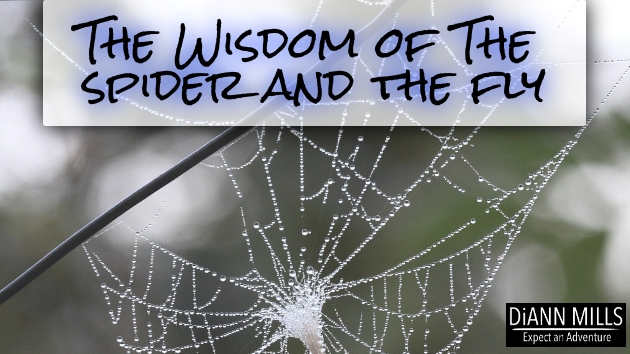By DiAnn Mills @DiAnnMills
A friend shared how his mother taught him as a child the way of good and evil, righteousness and sin through the poem The Spider and the Fly. I searched the public domain for this nearly 200-year-old writing. It’s fun, humorous, and touches us with its truth about humanity.
The Spider and the Fly (1829)
“Will you walk into my parlour?” said the Spider to the Fly,
“‘Tis the prettiest little parlour that ever you did spy;
The way into my parlour is up a winding stair,
And I have many curious things to shew when you are there.”
“Oh no, no,” said the little Fly, “to ask me is in vain,
For who goes up your winding stair can ne’er come down again.”
“I’m sure you must be weary, dear, with soaring up so high;
Will you rest upon my little bed?” said the Spider to the Fly.
“There are pretty curtains drawn around; the sheets are fine and thin,
And if you like to rest awhile, I’ll snugly tuck you in!”
“Oh no, no,” said the little Fly, “for I’ve often heard it said,
They never, never wake again, who sleep upon your bed!”
Said the cunning Spider to the Fly, “Dear friend what can I do,
To prove the warm affection I’ve always felt for you?
I have within m pantry, good store of all that’s nice;
I’m sure you’re very welcome–will you please to take a slice?”
“Oh no, no,” said the little Fly, “kind sir, that cannot be,
I’ve heard what’s in your pantry, and I do not wish to see!”
“Sweet creature!” said the Spider, “you’re witty and you’re wise,
How handsome are your gauzy wings, how brilliant are your eyes!
I’ve a little looking-glass upon my parlour shelf,
If you’ll step in one moment, dear, you shall behold yourself.”
“I thank you, gentle sir,” she said, “for what you’re pleased to say,
And bidding you good morning now, I’ll call another day.”
The Spider turned him round about, and went into his den,
For well he knew the silly Fly would soon come back again:
So he wove a subtle web, in a little corner sly,
And set his table ready, to dine upon the Fly.
Then he came out to his door again, and merrily did sing,
“Come hither, hither, pretty Fly, with the pearl and silver wing;
Your robes are green and purple–there’s a crest upon your head;
Your eyes are like the diamond bright, but mine are dull as lead!”
Alas, alas! how very soon this silly little Fly,
Hearing his wily, flattering words, came slowly flitting by;
With buzzing wings she hung aloft, then near and nearer drew,
Thinking only of her brilliant eyes, and green and purple hue–
Thinking only of her crested head–poor foolish thing! At last,
Up jumped the cunning Spider, and fiercely held her fast.
He dragged her up his winding stair, into his dismal den,
Within his little parlour–but she ne’er came out again!
And now dear little children, who may this story read,
To idle, silly flattering words, I pray you ne’er give heed:
Unto an evil counsellor, close heart and ear and eye,
And take a lesson from this tale, of the Spider and the Fly.
Mary Howitt
1799 – 1888
Have you found humor and wisdom in this poem?



Comments 38
Thank you, DiAnn for these wonderful words of wisdom. We need not be fooled by flattery!
Thanks, Linda, we don’t want to end up like the fly!
Oooh, I haven’t seen that poem in years! Still so true, even after nearly 200 years! Thanks for sharing it…good reminders! A similar story (probably inspired by the poem!) was written by Beatrix Potter, “The Tale of Jemima Puddle-Duck” who nearly becomes a roast duck dinner for a fox. 🙂 Lots of wisdom in those children’s stories and poetry!
Thanks, Nancy, and I will reread “The Tale of Jemima Puddle-Duck.” We all need wisdom.
I’ve never heard of “The Tale of Jemima Puddle-Duck!” I will have to look for it. Loved Beatrix Potter.
I had never heard of this poem. Thanks for sharing. 🙂
Teresa, you are so welcome! It’s filled with wisdom.
I almost laughed when I saw this. I just alluded to this poem in my last book when my main character was wondering if she should go into a house with a guy she had just met.
LOL! I hope your character listened!
Thanks for sharing this, DiAnn! I had never heard of this before. I love how deep its message is with such a simple illustration. Our downfall comes when we give the enemy time. It’s not enough to refuse the first temptation. If we don’t also remove the source of that temptation from our life, sooner or later, it will find our weakness and exploit it.
Diana, the poem tells us the more someone or something persists, the more enticing it becomes. Thanks for commenting!
Like the others, I had never heard the poem in its entirety. I also never realized how it fits our enemy the devil. How he traps us if we are willing vessels.
Thanks, Michelle, and the spider made his evil desires look like the best option – ever!
I’m not sure I’ve read the entire poem, but what words of wisdom.
Thanks, Jeanne, those were my thoughts too when I read the entire poem: a bit of sobering truth.
I remember my mother and grandmother quoting it as “Come into my parlor,” said the spider to the fly. I’ve quoted that one line myself many a time and most people just stare, wondering what I am referring to. Thanks for sharing the entire poem.
We can be trapped by all sorts of snares, promises, and things too good to be true. Thanks, DiAnn, for the reminder.
Karen, and too many times, we do not know where the snares, promises, and things too good to be true will lead us. Thank you!
That’s the way I had heard the first line, too, and have never read the entire poem. Thanks, DiAnn!
I am not sure I had ever read the whole thing, and it’s marvelous. Thank you for sharing, and a good reminder about vanity.
Kristine, thank you so much! The spider definitely had an agenda!
How fun to read this again in its entirety. Like the others, I had heard it before, but forgotten much of the wit and wisdom. Will share for sure!
Dana, I’m all about acquiring the wisdom – and the knowledge.
You know I’m keeping a copy of that poem Ms. DiAnn. Such a blessing today; thank you ma’am.
J.D., that poem may have been written for children, but it sure hit me hard.
Such wisdom and wit!!!
Thank you for sharing.
Thanks, Maureen. The poem reminds me of the movie: The Good, the Bad, and the Ugly. 🙂
I know I heard at least bits and pieces of this poem when I was young, but I never read it in its entirety until now. Wow! May we all heed this common sense warning, DiAnn!
Right, Martha. The spider sure made his viewpoint look enticing.
Such clever wit applying to the folly of vanity.
Thank you.
Thanks! Yes, vanity can destroy us if we’re not careful.
My dad read that to me when I was a little kid. Thanks for the memory! It was a good lesson for life.
Thanks, Tim. It’s a mix of sobering humor.
I’ve never read the entire poem until today.
Elizabeth, do you have a new appreciation for how we can be tricked into doing the wrong thing?
Just realized I’ve never read the whole thing—this is great!
Thanks, Becky. I read it a few times just to understand how clever the spider. 🙂
A firm no, and meaning it, can save us from going off a cliff. Better still, stay out of the enemy’s camp and refuse to engage in any conversation. Avoid slippery places.
Dawn, thank you! I agree – let’s stay away from the enemy’s camp.